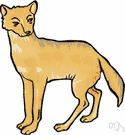canid
(redirected from Canids)Also found in: Thesaurus, Medical, Encyclopedia.
ca·nid
(kăn′ĭd, kā′nĭd)n.
Any of various widely distributed carnivorous mammals of the family Canidae, which includes the foxes, wolves, dogs, jackals, and coyotes.
[From New Latin Canidae, family name, from Canis, type genus, from Latin canis, dog; see canine.]
American Heritage® Dictionary of the English Language, Fifth Edition. Copyright © 2016 by Houghton Mifflin Harcourt Publishing Company. Published by Houghton Mifflin Harcourt Publishing Company. All rights reserved.
canid
(ˈkænɪd)n
any animal of the dog family
Collins English Dictionary – Complete and Unabridged, 12th Edition 2014 © HarperCollins Publishers 1991, 1994, 1998, 2000, 2003, 2006, 2007, 2009, 2011, 2014
can•id
(ˈkæn ɪd, ˈkeɪ nɪd)n.
any member of the dog family Canidae, including the wolves, jackals, coyotes, foxes, and domestic dogs.
[1885–90; < New Latin Canidae <Canis genus of dogs and wolves]
Random House Kernerman Webster's College Dictionary, © 2010 K Dictionaries Ltd. Copyright 2005, 1997, 1991 by Random House, Inc. All rights reserved.
ThesaurusAntonymsRelated WordsSynonymsLegend:
Switch to new thesaurus
| Noun | 1. |  canid - any of various fissiped mammals with nonretractile claws and typically long muzzles canid - any of various fissiped mammals with nonretractile claws and typically long muzzlescarnivore - a terrestrial or aquatic flesh-eating mammal; "terrestrial carnivores have four or five clawed digits on each limb" Canidae, family Canidae - dogs; wolves; jackals; foxes Canis familiaris, dog, domestic dog - a member of the genus Canis (probably descended from the common wolf) that has been domesticated by man since prehistoric times; occurs in many breeds; "the dog barked all night" wolf - any of various predatory carnivorous canine mammals of North America and Eurasia that usually hunt in packs Canis aureus, jackal - Old World nocturnal canine mammal closely related to the dog; smaller than a wolf; sometimes hunts in a pack but usually singly or as a member of a pair wild dog - any of various undomesticated mammals of the family Canidae that are thought to resemble domestic dogs as distinguished from jackals or wolves fox - alert carnivorous mammal with pointed muzzle and ears and a bushy tail; most are predators that do not hunt in packs paw - a clawed foot of an animal especially a quadruped |
Based on WordNet 3.0, Farlex clipart collection. © 2003-2012 Princeton University, Farlex Inc.